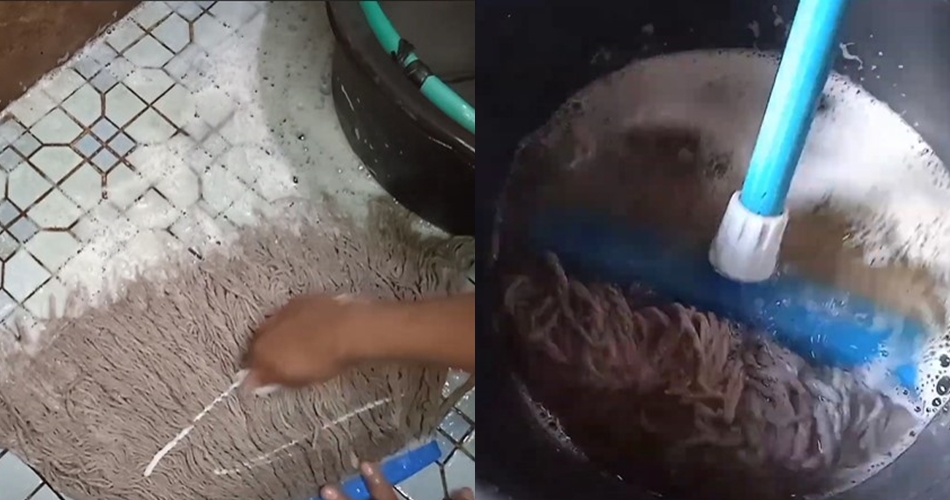foto: YouTube/Mama Kembar Ahsan Ihsan
Brilio.net - Mops are very useful for keeping floors shiny and rough. However, the more often it is used, the faster the cloth on the mop gets dirty. In fact, if it is never washed, the mop can become bristly and black, you know. Not to mention, mops that are very dirty sometimes also emit an unpleasant aroma.
A mop that has become soft will find it difficult to turn white again if you just wash it in the normal way. It's not surprising that many people are experimenting to find ways to turn black wool mops white again, for example by brushing them with dish soap, vinegar, detergent, or other ingredients.
However, netizens on the Mama Kembar Ahsan Ihsan YouTube account have another method that is no less effective. Investigate and investigate, even without the materials mentioned previously, wool and black mops can be transformed into white again like new. This netizen who is familiarly known as Mama Kembar also said that she added one kitchen ingredient to practice this method.
How to wash a black wool mop.
First, prepare a basin filled with enough hot water. Then dissolve a little baking powder in the hot water. Yup, baking powder is the main kitchen ingredient for how to turn a black wool mop into white again. Soak the mop and let it sit for approximately 10 minutes.
"After soaking for 10 minutes, you can see that the dirt has started to fall out, the water has started to get cloudy," added the owner of the YouTube account Mama Kembar Ahsan Ihsan, quoted by BrilioFood on Tuesday (27/2).
Mama Kembar said that she also often adds a little citrus or citric acid to the water soaking in this mop. Then, he continued the soaking process for about 5 to 10 minutes. You can add citrus if your mop is already very black.

photo: YouTube/Twin Mama Ahsan Ihsan
Then, apply a little dabbing soap to the mop. Brush the mop so that stubborn stains can be removed. Rinse the mop, then soak it in a bucket filled with hot water and a little laundry bleach. Soak the mop in this bleach solution until the water is no longer hot.

photo: YouTube/Twin Mama Ahsan Ihsan
After soaking it with bleach, remove the smell by brushing the mop with dab soap one more time. Finally, rinse the mop, dry it in the sun, and the mop is ready to be used again. How do you change a black wool mop to white again, according to netizens on the Mama Kembar Ahsan Ihsan YouTube account, it's really effective, right?

photo: YouTube/Twin Mama Ahsan Ihsan
Are you interested in trying this method or do you have another method? Taking a peek at Mama Kembar Ahsan Ihsan's YouTube upload, not many netizens have left comments, because this video was only shared 5 months ago. Even so, it has had more than 70 viewers, you know.
How to clean various other household furniture using baking powder.
Baking powder is really effective for cleaning wool mops. In fact, you can also use this kitchen ingredient to clean other household furniture, you know.
1. Kitchen cabinets.
You can use a mixture of baking powder and water to clean oily layers on kitchen cupboards, especially in areas near the stove or oven.
2. Kitchen equipment.
Baking powder can help clean kitchen utensils such as metal pots and pans. Mix baking powder with a little water and rub it onto the surface of the equipment to clean it.
3. Ceramic or porcelain.
Household utensils such as bowls, plates, or cups made of ceramic or porcelain can be cleaned by mixing baking powder with warm water and rubbing it onto the dirty surface.
4. Faucet.
Baking powder can also help clean dirty or rusty taps and faucets. Mix baking powder with a little water and rub it on the surface of the faucet to clean it.
5. Ceramics or gemstones.
Baking powder can help clean household furniture made of ceramic or gemstones such as sinks or bathroom tables. Mix baking powder with water and rub it into the surface to remove any stains or dirt.
6. Non-stick skillet.
Baking powder can also help clean nonstick skillets. Mix baking powder with a little water and rub it onto the surface of the pan to remove any stuck-on food particles.
(brl/tin)